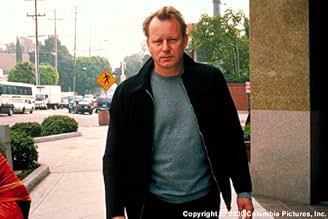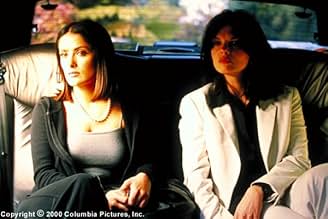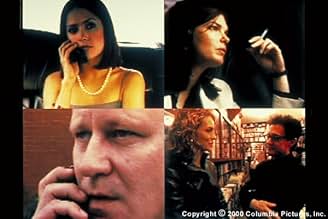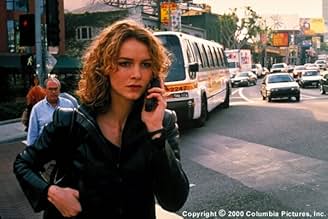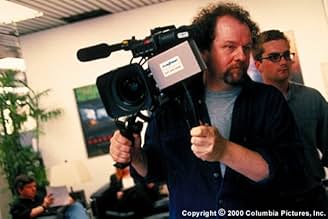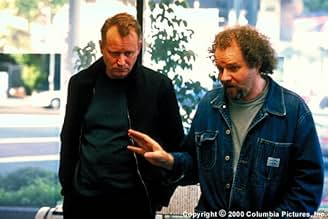AVALIAÇÃO DA IMDb
6,0/10
7,3 mil
SUA AVALIAÇÃO
Quatro quadros de ação simultânea que seguem alternadamente uma apaixonada amante lésbica enquanto ela fica obcecada com os flertes de sua parceira e os acontecimentos tensos de uma produtor... Ler tudoQuatro quadros de ação simultânea que seguem alternadamente uma apaixonada amante lésbica enquanto ela fica obcecada com os flertes de sua parceira e os acontecimentos tensos de uma produtora de filmes de Hollywood.Quatro quadros de ação simultânea que seguem alternadamente uma apaixonada amante lésbica enquanto ela fica obcecada com os flertes de sua parceira e os acontecimentos tensos de uma produtora de filmes de Hollywood.
- Prêmios
- 2 indicações no total
Avaliações em destaque
Mike Figgis does a Robert Altman. Except, instead of creating a large narrative of interconnecting plot strands, he puts them all on four split screens. Is this therefore more subversive than Altman? I don't think so - Altman's method is an attack on Hollywood linearity, on conventional methods of 'connection'; his characters exist is the same space but are emotionally etc. miles apart. The characters in 'Short Cuts', like the city of L.A. itself, are a mass without a centre. Figgis, for all the supposed diffusion of his visual strands, actually reunites, glues together Altman's ruptures. In this way it might seem a more optimistic kind of film. It isn't.
'timecode' is being touted as a revolution in cinema, a new way of watching films. Instead of watching one screen and being led by a director, we are given four, and asked to make our choices. I was surprised at how panicked I was at this in the first 20 minutes, darting between scenes, wondering which one I should follow. This forced me out of the film much more disturbingly than anything by Fassbinder or Godard. But this alienation is deceptive. Firstly we are not really bombarded by four narratives - put 'pierrot le fou', 'diary of a country priest', 'vampyr' and 'branded to kill' on four screens, then you'd be confused. Figgis leads you all the way, gives you an illusion of choice, but rarely fulfils it. The focus is on one screen at a time - either the soundtrack is turned up loudest, the plot is more interesting, whatever. For long periods of time, you can safely ignore other scenes because there is nothing going on - for about 20 minutes, for example, Lauren sits in a limousine listening to a bug planted on Rose; this leaves us free to watch another screen and see what she's listening to. Other scenes are merely tedious - eg Emma droning to her shrink (a nod to Godard's 'week end', that famous end of cinema?) - so that you gladly look elsewhere. It is possible to listen to one scene, and flit around at the others to catch up on what's going on.
What I'm saying is, 'timecode' is not a difficult experience - after the initial adjustment, you watch the film as you would any other, especially as all the stories converge and are really only one story. Even at the beginning, the feeling is less one of Brechtian alienation than akin to being a security guard faced with a grid of screens - you rarely think about the physical processes of film or performance, as you would in a Dogme or Godard film.
So if 'timecode' is less revolutionary than it seems, that doesn't mean it isn't a brilliant film, a real purse in a pig's ear of a year (or whatever the expression is). One reason for this is the four-screen structure: I would have to watch it a few more times, but I was very conscious of the orchestration of the screens, the way compositions, or camera movements, or close-ups etc., in one screen were echoed, reflected, distorted in the others - a true understanding of this miraculous formal apparatus would, I think, give us the heart of the film, and bely the improvised nature of the content. Figgis is also a musician - he co-composed the score - and the movement here, its fugues and variations are truly virtuosic, almost worthy of my earlier Altman comparison.
But the content is great fun too. At first I was disappointed at the self-absorbed drabness of the material, the idea that we shouldn't be made to work too hard because we've enough to deal with the four screens. And, it is true, that the stories rarely transcend cliche. But, such is the enthusiasm of the performers (people like Salma Hayek obviously relishing slightly more useful roles than the bilge they're usually stuck in); the precision of the structure; the mixture of comedy and pathos, and the way the style facilitates both, that you're convinced you're watching a masterpiece. Quentin's massaging and Ana's pitch are two of the funniest things I've seen in ages, while Stellan Skarsgard's rich performance stands out all the more for its brittle surroundings.
'timecode' is being touted as a revolution in cinema, a new way of watching films. Instead of watching one screen and being led by a director, we are given four, and asked to make our choices. I was surprised at how panicked I was at this in the first 20 minutes, darting between scenes, wondering which one I should follow. This forced me out of the film much more disturbingly than anything by Fassbinder or Godard. But this alienation is deceptive. Firstly we are not really bombarded by four narratives - put 'pierrot le fou', 'diary of a country priest', 'vampyr' and 'branded to kill' on four screens, then you'd be confused. Figgis leads you all the way, gives you an illusion of choice, but rarely fulfils it. The focus is on one screen at a time - either the soundtrack is turned up loudest, the plot is more interesting, whatever. For long periods of time, you can safely ignore other scenes because there is nothing going on - for about 20 minutes, for example, Lauren sits in a limousine listening to a bug planted on Rose; this leaves us free to watch another screen and see what she's listening to. Other scenes are merely tedious - eg Emma droning to her shrink (a nod to Godard's 'week end', that famous end of cinema?) - so that you gladly look elsewhere. It is possible to listen to one scene, and flit around at the others to catch up on what's going on.
What I'm saying is, 'timecode' is not a difficult experience - after the initial adjustment, you watch the film as you would any other, especially as all the stories converge and are really only one story. Even at the beginning, the feeling is less one of Brechtian alienation than akin to being a security guard faced with a grid of screens - you rarely think about the physical processes of film or performance, as you would in a Dogme or Godard film.
So if 'timecode' is less revolutionary than it seems, that doesn't mean it isn't a brilliant film, a real purse in a pig's ear of a year (or whatever the expression is). One reason for this is the four-screen structure: I would have to watch it a few more times, but I was very conscious of the orchestration of the screens, the way compositions, or camera movements, or close-ups etc., in one screen were echoed, reflected, distorted in the others - a true understanding of this miraculous formal apparatus would, I think, give us the heart of the film, and bely the improvised nature of the content. Figgis is also a musician - he co-composed the score - and the movement here, its fugues and variations are truly virtuosic, almost worthy of my earlier Altman comparison.
But the content is great fun too. At first I was disappointed at the self-absorbed drabness of the material, the idea that we shouldn't be made to work too hard because we've enough to deal with the four screens. And, it is true, that the stories rarely transcend cliche. But, such is the enthusiasm of the performers (people like Salma Hayek obviously relishing slightly more useful roles than the bilge they're usually stuck in); the precision of the structure; the mixture of comedy and pathos, and the way the style facilitates both, that you're convinced you're watching a masterpiece. Quentin's massaging and Ana's pitch are two of the funniest things I've seen in ages, while Stellan Skarsgard's rich performance stands out all the more for its brittle surroundings.
`Time Code' is the first film to use the method of split-screen quadrants where four stories, done in real time, unfold onto the screen. And an audacious, refined experience it is. This technique was going to be hit-and-miss. With four stories, you can only watch one at a time, and by focusing on one you may miss some key elements in another story. All are loosely intertwined, some more interesting than others. There is no digital grading/ authentication done to the images, so the film looks perfectly realistic.
The sound is emphasised on one of the screens at a time, though sometimes it is hard to differentiate which one. While the stories are perfectly watchable, they aren't invigorating or compelling and are only worthy of a passive attention. The narrative is strong and continued in a series of earthquakes that would rank about a 4 on the Richter scale. This is the first occasion in which I can honestly say that characters get plenty of screen-time (in fact they are in every scene), but barely develop.
Case in point is Saffron Burrows whose character is barely ever emphasised upon and we are offered pretty much no guidance as to what's going on in her story. Jeanne Tripplehorn's part is pretty much wasted as 95% of her screen-time is wasted on her simply sitting in her limo, barely even talking. She shows her true colours in the end, but these revelations are made too late in the game to be indispensable. In the third quadrant, there are many big names such as Holly Hunter, Salma Hayek, Julian Sands (`Leaving Las Vegas', `Naked Lunch), Stellan Skargaard (`The Glass House') and Kyle McLachlan. There are solid, subtle performances all round from the ensemble, but the characters themselves are poorly written.
Still though, Mike Figgis' avant-garde risque direction is suitably original and proves to be a talent to look out for in the future. While it is an accurate portrayal of high-class Los Angeles, there is an over-emphasis on drug use and lesbianism that compromises the originality of it all. `Time Code' must have been a step away from `impossible' to film. As there were no edits and stories took place in real time as they interwove, there's no telling how many takes they had to execute.
If one actor were to forget their line after about 90 minutes, everything would have to start all over again from the top. It's a surprise that the film even finished shooting, but they pulled it off and that deserves admiration. The movie ends on a sourly climactic moment that may leave a bad taste, but seems perfectly in keeping with Figgis' bravura tone. If you haven't yet seen `Time Code' it's best you know the gist of the plot and sub-plots before watching it, or you'll be absolutely lost from start to finish.
One of the most groundbreaking, though not spectacular, movies in recent year, `Time Code' proves to be an intelligent, admirable effort. While this experiment is unlikely to be attempted again, this is the first and undoubtedly the best of its kind. It definitely should have received attention on Oscar night. Curiously enough, the sound effects editing is the film's strongest point. My IMDb rating: 7.4/10.
The sound is emphasised on one of the screens at a time, though sometimes it is hard to differentiate which one. While the stories are perfectly watchable, they aren't invigorating or compelling and are only worthy of a passive attention. The narrative is strong and continued in a series of earthquakes that would rank about a 4 on the Richter scale. This is the first occasion in which I can honestly say that characters get plenty of screen-time (in fact they are in every scene), but barely develop.
Case in point is Saffron Burrows whose character is barely ever emphasised upon and we are offered pretty much no guidance as to what's going on in her story. Jeanne Tripplehorn's part is pretty much wasted as 95% of her screen-time is wasted on her simply sitting in her limo, barely even talking. She shows her true colours in the end, but these revelations are made too late in the game to be indispensable. In the third quadrant, there are many big names such as Holly Hunter, Salma Hayek, Julian Sands (`Leaving Las Vegas', `Naked Lunch), Stellan Skargaard (`The Glass House') and Kyle McLachlan. There are solid, subtle performances all round from the ensemble, but the characters themselves are poorly written.
Still though, Mike Figgis' avant-garde risque direction is suitably original and proves to be a talent to look out for in the future. While it is an accurate portrayal of high-class Los Angeles, there is an over-emphasis on drug use and lesbianism that compromises the originality of it all. `Time Code' must have been a step away from `impossible' to film. As there were no edits and stories took place in real time as they interwove, there's no telling how many takes they had to execute.
If one actor were to forget their line after about 90 minutes, everything would have to start all over again from the top. It's a surprise that the film even finished shooting, but they pulled it off and that deserves admiration. The movie ends on a sourly climactic moment that may leave a bad taste, but seems perfectly in keeping with Figgis' bravura tone. If you haven't yet seen `Time Code' it's best you know the gist of the plot and sub-plots before watching it, or you'll be absolutely lost from start to finish.
One of the most groundbreaking, though not spectacular, movies in recent year, `Time Code' proves to be an intelligent, admirable effort. While this experiment is unlikely to be attempted again, this is the first and undoubtedly the best of its kind. It definitely should have received attention on Oscar night. Curiously enough, the sound effects editing is the film's strongest point. My IMDb rating: 7.4/10.
Watching the film, it was easy to see that it was a challenge to film. I think it was well directed and coordinated. If only I could get past the fact that the plot line is craptacularly boring. There is really very little memorable about the plot. I mostly entertained myself in the challenge of trying to follow as much of it as possible. It was kind of fun to see a conversation going on in one frame, and seeing that same conversation simultaneously taking place in the background of another frame. Thus I can't imagine wanting to watch it more than once. Good to rent, but not to buy. I made that mistake, but that doesn't mean you have to.
In an age where top-rated films involve Australians in xenophobic, concocted histories, or should-know-better Oscar winners in films about nicking cars, innovation seems rarely welcome.
It comes as no surprise then that the first film to be told via four separate panels on the screen, with continuous 93m takes and improvisation should only be shown on one single screen in the whole of the West Midlands.
What did surprise me, however, is that the film isn't that good. It is above average, though is too mainstream to really appeal to the artset, and too arty to interest a mainstream audience. The attention is directed around the four separate panels by virtue of judicious sound editing; dips and fades occurring throughout.
Of the four panels, while their fixations may merge or change, generally speaking they take the following form: the top two are the serious ones, the upper left seeing Lauren Hathaway (Jeanne Tripplehorn) using surveillance to listen in on her girlfriend's conversations, whom she (correctly) suspects is having an affair. The upper right is the dullest, a meandering affair with the self-absorbed Emma (Saffron Burrows) who goes through counselling and has very little interaction or involvement with the rest of the film.
Lower left are the cast-offs, often sharing perspective with its adjacent panels and mostly being used for light relief. Lower right, arguably the most interesting, is centred on a movie production meeting which allows for some industry parodies. These include movies such as "Time Toilet", "Bitch" and a hip-hop Soviet incidental music that offers "Can you dig it - Trotsky in da house!"
I did chuckle at the Asian staff member whose name - Connie Ling - produces sniggers when introduced, though Onyx Richardson's (Golden Brooks) assertion that black people get short shrift in film seems hollow when you consider the only thing her character gets to talk about is her colour, and that she's the only black cast member. The film's lesbian relationships also seem only there for titillation. Lastly, when you meet a character who pitches a film based around four separate panels and continuous takes (dismissed by a committee member as "pretentious s***") you realise that this film either isn't as clever as it thinks it is or too clever by half. Without the gimmickry - and it could easily get by with only half of it's four screens - this would be a forgettable 4. Therefore, isn't it a pity that the innovation wasn't applied to a better movie? 6/10.
It comes as no surprise then that the first film to be told via four separate panels on the screen, with continuous 93m takes and improvisation should only be shown on one single screen in the whole of the West Midlands.
What did surprise me, however, is that the film isn't that good. It is above average, though is too mainstream to really appeal to the artset, and too arty to interest a mainstream audience. The attention is directed around the four separate panels by virtue of judicious sound editing; dips and fades occurring throughout.
Of the four panels, while their fixations may merge or change, generally speaking they take the following form: the top two are the serious ones, the upper left seeing Lauren Hathaway (Jeanne Tripplehorn) using surveillance to listen in on her girlfriend's conversations, whom she (correctly) suspects is having an affair. The upper right is the dullest, a meandering affair with the self-absorbed Emma (Saffron Burrows) who goes through counselling and has very little interaction or involvement with the rest of the film.
Lower left are the cast-offs, often sharing perspective with its adjacent panels and mostly being used for light relief. Lower right, arguably the most interesting, is centred on a movie production meeting which allows for some industry parodies. These include movies such as "Time Toilet", "Bitch" and a hip-hop Soviet incidental music that offers "Can you dig it - Trotsky in da house!"
I did chuckle at the Asian staff member whose name - Connie Ling - produces sniggers when introduced, though Onyx Richardson's (Golden Brooks) assertion that black people get short shrift in film seems hollow when you consider the only thing her character gets to talk about is her colour, and that she's the only black cast member. The film's lesbian relationships also seem only there for titillation. Lastly, when you meet a character who pitches a film based around four separate panels and continuous takes (dismissed by a committee member as "pretentious s***") you realise that this film either isn't as clever as it thinks it is or too clever by half. Without the gimmickry - and it could easily get by with only half of it's four screens - this would be a forgettable 4. Therefore, isn't it a pity that the innovation wasn't applied to a better movie? 6/10.
You know, some times an 'idea' has never been done before because it should never be done. This movie is a perfect example. Why on earth would anybody think that people want to see a movie split into four quadrants?
I mean, I could take a script as bad as this, and film it upside down. Does that make it good because it is 'daring and original'?
I mean, I could take a script as bad as this, and film it upside down. Does that make it good because it is 'daring and original'?
Você sabia?
- CuriosidadesThe actors and actresses were responsible for their own costumes, hair, and make-up.
- Erros de gravaçãoCameraman reflected on an elevator door as he follows Emma after the therapist sequence.
- Versões alternativasThe film was transferred from digital video to film stock for theatrical presentation. The video release, however, uses the original digital video picture format.
- Trilhas sonorasComfort Of Strangers
Written by Mike Figgis, Anthony Marinelli and Skin
Performed by Skin
Courtesy of Virgin Records Limited
By Arrangement with Red Mullet Ltd.
Principais escolhas
Faça login para avaliar e ver a lista de recomendações personalizadas
- How long is Timecode?Fornecido pela Alexa
Detalhes
Bilheteria
- Orçamento
- US$ 5.000.000 (estimativa)
- Faturamento bruto nos EUA e Canadá
- US$ 1.057.750
- Fim de semana de estreia nos EUA e Canadá
- US$ 93.148
- 30 de abr. de 2000
- Faturamento bruto mundial
- US$ 1.431.406
- Tempo de duração
- 1 h 37 min(97 min)
- Cor
- Mixagem de som
- Proporção
- 1.85 : 1
Contribua para esta página
Sugerir uma alteração ou adicionar conteúdo ausente


